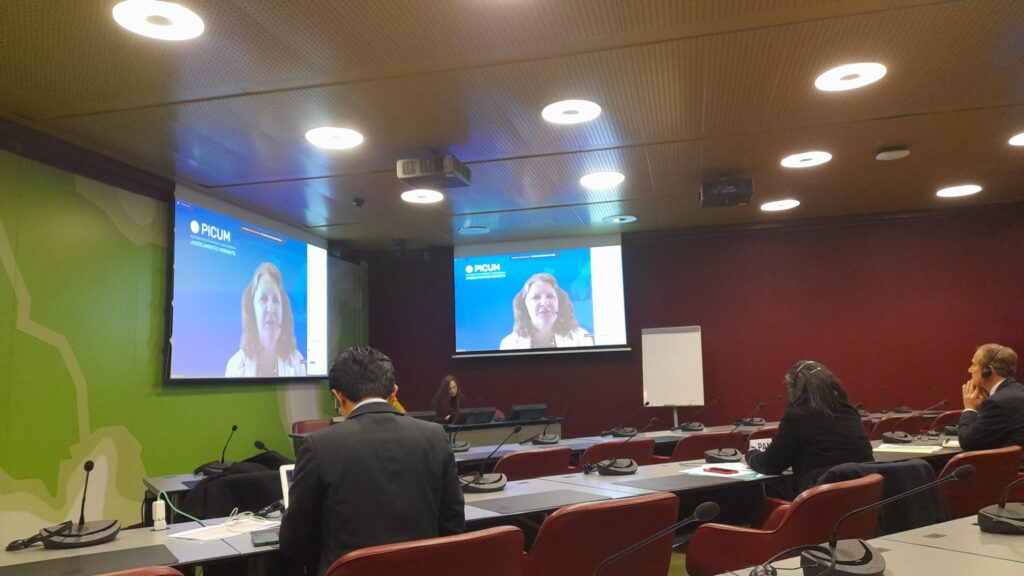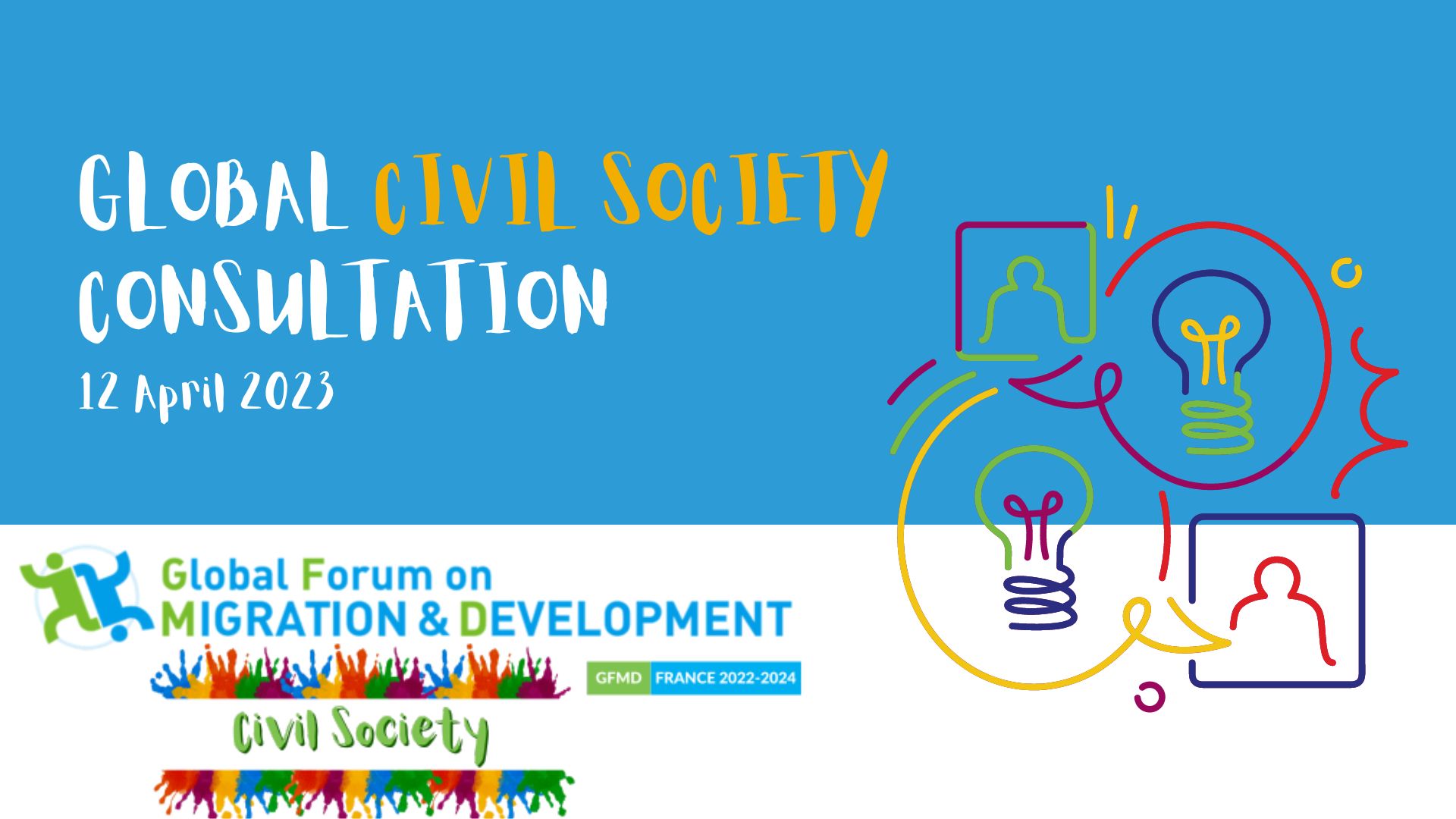On 12 April 2023, civil society gathered virtually for a global consultation in preparation for the 2nd GFMD Preparatory Meeting under the current French Chairmanship. The GFMD preparatory meeting itself was held on 18-19 April in Geneva with 6 multi-stakeholder roundtable dialogues on the draft background papers for the 2022-2023 GFMD. Civil society thematic leads who steered each thematic discussion during the global civil society consultation, presented civil society’s collective inputs for each background paper.
Global Civil Society Consultation on Draft Thematic Background Papers
In anticipation and preparation for the 2nd preparatory meeting of the GFMD under the current chairmanship of France, the GFMD Civil Society Mechanism, guided and led by its International Steering Committee, hosted a global consultation on 12 April 2023, to discuss key elements and advocacy points we collectively wished to see articulated in the background papers of each of the 6 thematic priorities of this year’s GFMD. The consultation was held virtually in English, French and Spanish simultaneously, and had more than 60 participants, representing various regions and civil society networks from around the world. The agenda included an opening and summary of the civil society process to date, 2 concurrent breakout sessions covering 3 thematic priorities in each session, then a report back and conclusion plenary session.
The opening segment included a review and reports of the civil society process to date, beginning with the 30 January – 1 February Abuja Civil Society Forum, which marked the soft launch of the GFMD civil society process. The Abuja Forum brought together more than 60 African civil society from around the continent, and African diaspora from Europe and North America, to be briefed on the GFMD and other regional migration processes, and then to discuss their collective initial inputs to 3 of the most relevant GFMD thematic priorities: on climate change, diaspora contributions, and labour migration.
Following the Abuja Forum, at the end of February, the Association of German Development and Humanitarian Aid Non-Governmental Organisations – VENRO, organised a two-day workshop in Dakar to strengthen the discussions between African and European civil society on the issues affecting migration policy, touching also on the GFMD themes. The Middle-East and North Africa (MENA) region also held their own consultation on the GFMD just days later in Dubai. The Cross-Regional Center for Refugees and Migrants (CCRM) hosted this sub-regional consultation on 3 March, coordinating engagement from civil society to discuss thematic issues and dynamics of intra- and inter-regional migration. Other consultations and preparatory activities have also been undertaken in Asia-Pacific and Latin America.
After this series of reports of regional preparatory activities to date, the participants of the consultation then broke into small groups to discuss the draft background papers and key civil society inputs to the 6 GFMD thematic priorities of climate change, rights, diaspora, labour migration, narratives and culture, and multi-level governance. Thematic leads for each theme then summarized the key collective points in the closing segment and began their preparations to present these during the 2nd GFMD Preparatory Meeting.
2nd GFMD Preparatory Meeting and the Government-led Roundtables
On 18 and 19 April, the GFMD Chairmanship under France organized their 2nd Preparatory Meeting. The core of the agenda of this round were the 6 government-led roundtables which focused on reviewing the zero drafts of each thematic priority’s background paper. The sessions were led and moderated by the Government-led Roundtable Teams (GRTs) co-chairs, and the draft background papers were presented by the respective penholders.
Given the modalities of these government-led discussions, only 2 representatives of each stakeholder mechanism (including civil society) were given the floor to present inputs, even as other civil society representatives were present both in person and online. As such, global civil society self-selected 2 thematic leads for each theme, and used the global civil society consultation the week prior to gather and collectivize inputs and recommendations from civil society from around the world, for the thematic leads to present during each roundtable discussion .
The following are summary points presented by our civil society thematic leads under each theme:
…On the Impact of Climate Change on Human Mobility
The impacts of climate-related disasters will disrupt agricultural production yields, disrupt ecosystems, cause food security and harm many communities’ livelihoods. Resilience will be pushed to the brink and effects on employment will demand alternatives to traditional jobs. Safe, rights-based migration will play a critical role in adaptation and in achieving climate-resilient sustainable development.
Alianza Americas and Secours Catholique highlighted:
“It’s essential to incorporate climate-induced internal movement into the discussion. With the limitation of focusing on “forced internal displacement”, it is unlikely to be able to get into the discussion of addressing how movement results from the indirect effects of slow-onset processes, nor to situations of people moving not in the immediate aftermath.”

They also advocated for the following:
- Discussions on the allocation of loss and damage funds must ensure the inclusion of representative voices from affected communities, in order for proper distribution to reach those who are impacted.
- Expand partnerships and adopt bilateral initiatives.
- Explore permanent solutions. Longer-term solutions must include the right to work, but furthermore include the upholding of rights at work.
- Promotion of climate literacy and educating communities who are directly impacted, to incorporate their voices into the conversation.
…On Rights and Migration
Is regular migration enough? When regularisation is introduced to reduce irregular migration, it must be accessible, timely, and affordable otherwise it will not work as intended. Regularisation does not necessarily guarantee decreased vulnerability.
In their intervention, Migrants Rights Initiative and the Platform for the International Cooperation on Undocumented Migrants (PICUM) advocated for:
- Ensuring the protection and upholding of rights that enable inclusive participation of migrants, such as the rights to information and to association.
- Establishing key rights and safeguards in migration corridors.
- Rights-based approaches that guarantee protection against criminalisation for those working in solidarity with migrants.
- Emphasising the equality of rights and non-discrimination between citizens and migrants is essential, regardless of nationality and category of migrants.
- Evaluating human mobility in 2023 with the adoption of the 75 years of UDCHR and stressing the importance of compliance with existing rights frameworks.

…On Diaspora Engagement
Member States and other stakeholders must work to create conditions in which diaspora organisations can fully contribute to sustainable development in countries of origin, through financial contributions (remittances) or non-financial contributions (social remittances, knowledge and skills transfers, social and civic engagement, cultural exchange).

African Foundation for Development (AFFORD) and FORIM brought forward the issues on:
- Ensuring that diaspora initiatives are encapsulating diaspora agency. Many diaspora initiatives are neither designed, led or co-led by the diaspora.
- Scaling up diaspora work by finding and working with mechanisms that will leverage relevant finances.
- Strengthening civil society organizations and diaspora organizations to get to the negotiating table.
- Encourage discussion on the growing European diaspora in Africa and its implications.
- Focus on the contribution of diasporas’ investments in the context of climate change.
- Promote a focus on multi-generational aspects.
…On Labour Migration
There is a labour migration resurgence, with a high demand for migrant workers with appropriate skills. Pre-existing labour shortages have been exacerbated by the pandemic, creating an opportunity for migrant workers of any skill level.
Building and Woodworkers International (BWI) and the International Trade Union Confederation (ITUC), affirmed that:
We must explicitly stand against discrimination and include a component of gender equality when discussing anti-discrimination. Beyond access to employment but including access to social security and benefits. The ratification and enforcement of ILO anti-discrimination standards and instruments should include the promotion of decent work, especially for migrants working in an informal economy.
Their intervention also touched upon the following elements:
- Focus on fair recruitment principles and the responsibilities of the employers.
- Ensure access to social benefits for workers and retirees.
- Explore the concepts of ‘brain-drain’ and reintegration.
- Ensure the right to self-organise and collective bargaining regardless of migration status for workers.
- Change the narrative to highlight migrants’ contributions to our societies and economies.
- States must invest in social cohesion.
- Call for labour migration to be addressed more holistically.

…On Culture and Narratives
Migration narratives can work to strengthen social cohesion and combat xenophobia as well as discrimination against migrants and refugees.
The Global Research Forum on Diaspora and Transnationalism (GRFDT) and NGO Committee on Migration pushed for a multi-dimensional vision on narratives among other elements such as how identity is tied to territory. They explained that:
There are interesting multi-cultural, participatory art experiences involving young generations of migrant and refugee families who were born in the host countries and are suspended between two worlds, the culture of the community of origin of their families and the culture of the country where they were born and of which they feel citizens, even if they are not given nationality right at birth. Through these participatory processes, they can build their own cultural identity as a dynamic process of encounter between culture. How can we continue to use the stories that we have, roping in the stories of the young people, but to make them more effective in changing people’s, perceptions, and communities? What strategies should be brought forward?

It is also important to note:
- The role of migrants in understanding and helping to provide spaces with a balanced narrative to promote integration and explore issues of cultural heritage.
- The need to acknowledge the racialisation of people on the move, such as the criminalisation of Blackness.
- Not cherry-picking which diversity of migrants to include into discussions.
- Migrants and diaspora identities are inter-generational and closely connected to their cultural heritage.
- Unpack the impact that negative narratives driven by politics have on social cohesion and barriers to social inclusion.
…On Multi-level Governance
The paper calls for increasing recognition that there is a need for multi-level governance and the recognition of local and regional governments’ role. Multi-level governance and multi-stakeholder participation has now become enshrined in global processes, such as the 2030 Agenda and Global Compact for Safe, Orderly and Regular Migration – adopting not only the whole of government approach but this concept of the whole of society. The GFMD has played a role historically, in journeys of recognition through the dialogues that have taken place in previous sessions and the inclusion of sub-national levels of government.
The Pan-African Network in Defense of Migrants Rights (PANiDMR) and Migrants Forum in Asia (MFA) presented a multi-stakeholder approach to governance:
Governance is comprised of all actors, including civil society. There is no whole of government without the whole of society. There must be implementation of a monitoring and evaluation instrument. We need to assess what is going on in terms of progress. What is effective engagement from each of the different actors?
Focus was also placed on:
- Civil society not being referenced in the realm of governance. Yet, civil society partnerships are being used to influence governance on the local, national, and regional levels.
- Expanding the role of governance to support labour rights/labour governance though multi-stakeholder partnerships.
- Confronting the fact that there is a lack of visibility and consultation with diaspora actors. As the role they play in supporting migrants on the ground is important, the dialogue between governments should envision consultation with diasporas.
- Considering questions such as: How does political right influence migration governance today? How is migration governance done today? What are its challenges?

Looking Ahead
These priorities will be taken forward throughout the GFMD Summit process, and civil society actors will reconvene in preparation for the upcoming GFMD Workshops in June on Climate, Culture and Narratives in the context of Mobility.

